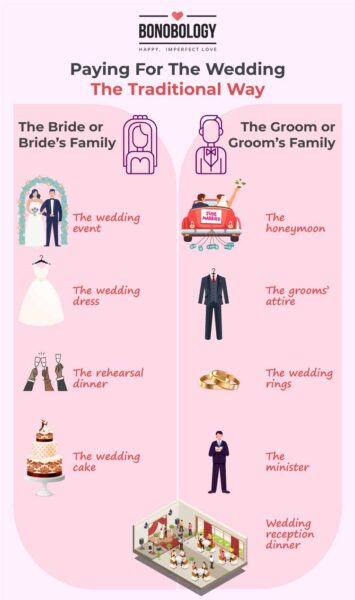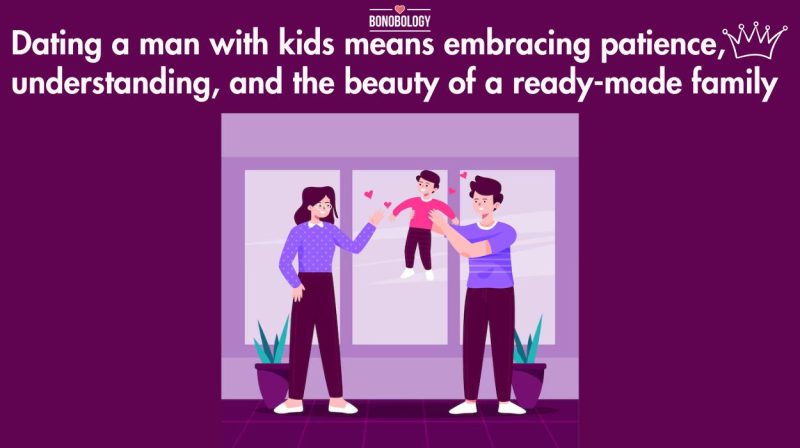A wedding is an expensive affair, there is no denying that. If you want to have a beautiful venue, an exotic cake, a diamond ring, and on top of that a honeymoon abroad, you can bet your top dollar that it will cost you a pretty penny. On top of that, if you’re working on a strict wedding budget, questions such as who pays for a wedding, which expenses fall in bride’s share, which ones in groom’s, and which ones you can split have to be addressed.
You can daydream about your perfect wedding, complete with the perfect floral arrangements and your favorite band for entertainment all day long, but the fact of the matter is that, at the end of the day, all of this boils down to bills that need to be footed. The very thought and question of, “Who is paying for the wedding?”, might just send shivers down your spine, because it is indeed a tough one to answer. Is it going to be the bride’s family or is it the groom’s? And how does one exactly navigate those expectations?
This can lead to a host of other questions: What does the bride’s family pay for and what is the groom’s family supposed to pay for in a traditional wedding? Do you want to stick to these traditional roles or come up with your own? Should you ask your parents for help? Should you ask your partner? Can you actually afford your favorite band, or do you need to rely on Uncle Jerry’s guitar-playing skills? Maybe it’s best to just splurge on the band actually and maybe save on the wedding party decor in that case.
To put your mind at ease, let’s talk about the intricacies of paying for a wedding and also understand how to plan and stick to a wedding budget. And also how you can navigate through the traditional way of paying for the wedding and the new-age way of sharing the expenses between the bride and the groom’s family and find a sweet spot that works well for both sides. While we’re at it, let’s also talk about another important thing that most newlyweds-to-be have to think about: Who pays for the honeymoon?
Why Do The Bride’s Parents Pay For The Wedding?
Table of Contents
As per traditional norms, it was expected that the bride’s family would pay for the wedding and maybe also the engagement party. Although in some cases, the groom’s family offered to pitch in with the expenses. An average American wedding expense, inclusive of everything, is around $33,000.
Traditionally, in accordance with gender roles, it was believed the groom would pay for the honeymoon and then would be responsible for buying a house and supporting his wife financially. So, it was just understood that the wedding budget had to be managed and paid for by the bride’s parents since the groom would take on her financial responsibility after the wedding.
“Why does the bride pay for the wedding? At our wedding, we didn’t much care about what the traditional way to do it was. We decided to pay as much as we could ourselves and then took help from our respective parents when we thought we needed it. We didn’t really care for the intricacies of what is the groom responsible for paying for in a wedding or what the bride purchases. We decided to split it equally. And the best thing was that our wedding planner was my best friend so that was free,” says Jacob, talking about how Martha and he decided on paying for the wedding.
The intricacies of who pays to cover costs depend on your dynamic but it’s always helpful to take a look at the way it has traditionally been done and the options available.
Do Bride’s Parents Still Pay For Most Of The Wedding?
If the bride’s parents are shouldering the wedding costs, then yes, they are expected to pay most of it. However, the groom’s parents are also expected to pay a certain amount, at least at most weddings nowadays. People are becoming more progressive and things are indeed changing. While earlier it was understood that the bride traditionally pays, that is not the case anymore. So, who pays for the wedding? Here’s how the basic payments are typically divided:
Related Reading: How To Have A Non-Religious Wedding – Some Awesome Tips!
1. Who pays for the wedding ceremony and wedding planner?
The most important question in this entire discussion about the division of expenses is: who pays for a wedding ceremony? The bride/bride’s parents pay for this, although the groom/groom’s parents can buy things like alcohol or any added purchases, like entertainment in the form of fireworks, dancers, or any other performances. But in most cases, the bride’s family does not have expectations from the groom’s side. The bride’s parents pay for the venue rental fees, the decorations, all the food, and all other arrangements like photography, video, guest’s stay, and transportation.
It’s a huge chunk of the expenses that they take up so they have to allocate quite a few thousand dollars to the wedding event expenses budget. Some couples even apply for a joint wedding loan or use a wedding credit card and pay it off together post-wedding. Sometimes, a parent may need to co-sign such a loan if the couple doesn’t have a good credit score. Exactly how you want to go about paying for the big day should be among the things you discuss before you get married. And discuss it at great length, along with your guest list.

2. Who pays for the honeymoon?
Because the woman’s family paid for the engagement party and the wedding, does the groom now pay for the honeymoon and everything that comes after? Well, yes, the groom usually foots the bill for the honeymoon. Though grooms can take assistance from their family, the responsibility usually falls on them, at least in a traditional set up.
Before you hit the roof thinking how much your trip to the Maldives or Bora Bora will cost you, the good news is you can create an online honeymoon registry where you can divide the expenses and ask your guests to pick up a part of the expenses as a gift.
3. What does the bride’s family pay for? The dress
As you’d expect, the answer to, “Who pays for the wedding dress?”, is the bride’s father, well, traditionally speaking. However, in recent times, the bride or the couple themselves pay for the wedding dress, as they prefer to not put that kind of pressure on their families. But do keep in mind that this pertains to only what the bride is going to wear, and not what the bridesmaids and the best man will wear.
Related Reading: Modern Wedding Suits For Groom – 25 Ideas
4. Wedding etiquette: who pays for the clothing?
The cost of the groom’s attire is usually his to bear. A groom may also chip in for the color-coordinated clothes of the bridesmaid or the groomsmen. Buying the boutonnieres is his responsibility, and if he’s planning some gifts for his groomsmen, that’s his choice. The average price of a wedding dress is around $1,600 and the groom’s tux costs a minimum of $350. It could also be rented for around $150.
5. Who pays for the wedding rings?
The groom is usually expected to buy wedding rings for himself and his bride. Both the bride’s and the groom’s wedding bands cost around $2,000 on average. Sometimes the bride’s side opts to buy the groom’s ring and extend some financial help. But the groom definitely buys the bride’s bouquet that she carries down the aisle. That one is on him, without a question. The bouquet is a very important part of the wedding and it has to match the wife’s attire and has to be her choice as well.
Related Reading: Premarital Counseling – 12 Reasons You Should Opt For It
6. Who’s paying the minister for the wedding?
A minister is not only an extremely important member of the wedding party but also one that comes for a fee. In regular setups, the groom pays for the marriage license and officiant’s fees. A Christian wedding is officiated by a pastor, such as a priest or a vicar. The pastor’s fees can range from $100 to $650. The cost of a marriage license differs from state to state, but it is usually between $50 and $100.

7. Who pays for the rehearsal dinner?
When deciding on the wedding venue and making preparations for the big day, one also has to factor in the rehearsal dinner. Which is when another question crops up: Who pays for the rehearsal dinner? Traditionally, both sides pay for this pre-wedding event. The menu and the venue of the rehearsal dinner are decided upon by both parties and family members from both sides chip in. The cost of a rehearsal dinner is usually between $1,000 and $1,500. We know that sounds like a lot. Perhaps that’s why financial planning for newly married couples is so important.
8. Wedding etiquette: Who pays for the wedding reception dinner?
What is the groom’s family supposed to pay for? Among other things, typically, the groom/groom’s family pays for the wedding reception. Since it’s an event that takes place after the wedding, they are expected to pick up the entire tab.
Related Reading: 12 Trendy Wedding Gifts Your Groom To Be Will Love
9. Does the bride’s family pay for the wedding cake?
Who pays for the wedding cake? Well, since one mostly expects the bride’s family to cover costs most of the time, it is possible that one assumes that the cake is also billed to her family. But hear this. There is quite a bit of controversy about the cake, actually. Traditionally, the groom’s family pays for the wedding cake and the bride’s bouquet, but some families have the tradition of the bride’s family paying for the cake. So it boils down to the traditions both families follow. The average cost of a wedding cake in the US is $350, but it can vary substantially depending on how intricate the cake is and the number of wedding guests.
What Is Proper Etiquette For The Groom’s Parents To Pay?
Ideally, both families should meet over a meal one day to discuss wedding plans, settle on mutual finances, settle on the wedding budget, and decide who is the wedding planner so that there is no fuss later on. They should let each other know about their family traditions and what needs to be followed and what can be done away with.
Then, a basic budget can be drawn up. The proper etiquette for the groom’s parents is to take up the list and offer to pay for the items that are traditionally expected from them and they could offer to pay for a few other things to lighten the burden on the bride’s family.

Whether the bride’s side would accept that or not is up to them, but it is good etiquette on the part of the groom’s parents to offer to pay. This helps in building a bond between both families. Hence, instead of focusing on, “Why does the bride pay for the wedding?”, try to facilitate the whole process by being a bit generous and offering to take up a few more expenses.
Related Reading: 21 Gifts For Lesbian Couples – Best Wedding, Engagement Gift Ideas
Who Pays For The Big Day These Days?
What does the bride’s family pay for these days in a wedding? The answer to this question has changed drastically over time. Unlike a just-out-of-college girl getting married to the love of her life in yesteryears, modern couples get hitched usually much later in life, after they have built successful careers and attained some financial stability. They prefer not to carry a student loan into marriage and try to be debt-free before they tie the knot. The purpose of marriage, to them, isn’t to check off an item on a “to-do list” of milestones mandated by society but to celebrate their love and commitment toward each other.
According to research, the average age of marriage for women in the US is 27.8 years, and the average age of marriage for men is 29.8 years. That means both partners are capable of funding their own wedding. So, the expectation has shifted from the bride’s family to the bride and the groom, and they work out the costs among themselves.
Usually, among most couples, it is the bride and groom who spearhead the conversations between the two families about who pays for the big day. They let them know what they would like to pay for and then if the bride’s and the groom’s family would like, they agree to take up some wedding costs. Usually, both families agree to pay for the wedding.
Key Pointers
- Most families are now choosing split costs of weddings but there are some traditional ways of going about it
- The bride’s family usually covers things such as the wedding ceremony, the minister and her clothes
- The groom’s family pays for the cake, and outfits of the groomsmen, splits the rehearsal dinner with the bride’s side and also covers the bill for the honeymoon
Now that you know everything about paying for a wedding, right down to paying a minister for the wedding or the reception dinner, you’re probably in a better place to make decisions. However, when it comes to sharing expenses in a relationship, the traditional norms are hardly followed anymore.
Since most couples believe in equality nowadays, it is not a given that the father of the bride would pay for the wedding. If the film Father Of The Bride had been made now, it would certainly have incorporated the changing norms of a modern wedding.
Your contribution does not constitute a charitable donation. It will allow Bonobology to continue bringing you new and up-to-date information in our pursuit of helping anyone in the world to learn how to do anything.






















Featured
How To Start Dating: Tips For Beginners & Those Starting Again
25 Bedtime Stories For Girlfriend
From Self-Awareness To Compatibility: Digital Twins For Modern Relationships
Situationship Vs Relationship: Can One Lead To The Other?
How To Get A Guy To Like You: 20 Simple Techniques, No Mind Games
Situationship Vs Friends With Benefits: Similarities And Differences
The Significant Difference Between Love You And I Love You
125 Spicy Questions To Ask Your Boyfriend
125 Deep Questions To Ask Your Boyfriend To Truly Understand Him
Balancing Love And Learning: How Online Degrees Can Strengthen Relationships
What Is A Power Couple? 15 Signs You And Your Partner Are One
What Is The Role Of A Husband In A Modern Relationship?
Marrying An Older Woman: Pros And Cons, And How To Make It Work
Everything You Need To Know About Transactional Relationships
Premarital Counseling – 12 Reasons You Should Opt For It
Living Apart Together: Decoding The Latest Trend Said To Save Relationships
Domestic Partnership vs Marriage: Difference & Benefits
Marrying For Money: Is It The Right Choice For You And How To Make It Work?
21 Things To Know About Dating A Man With Kids
Surprising Psychological Benefits Of Women Proposing To Men And 19 Ways To Do It Right